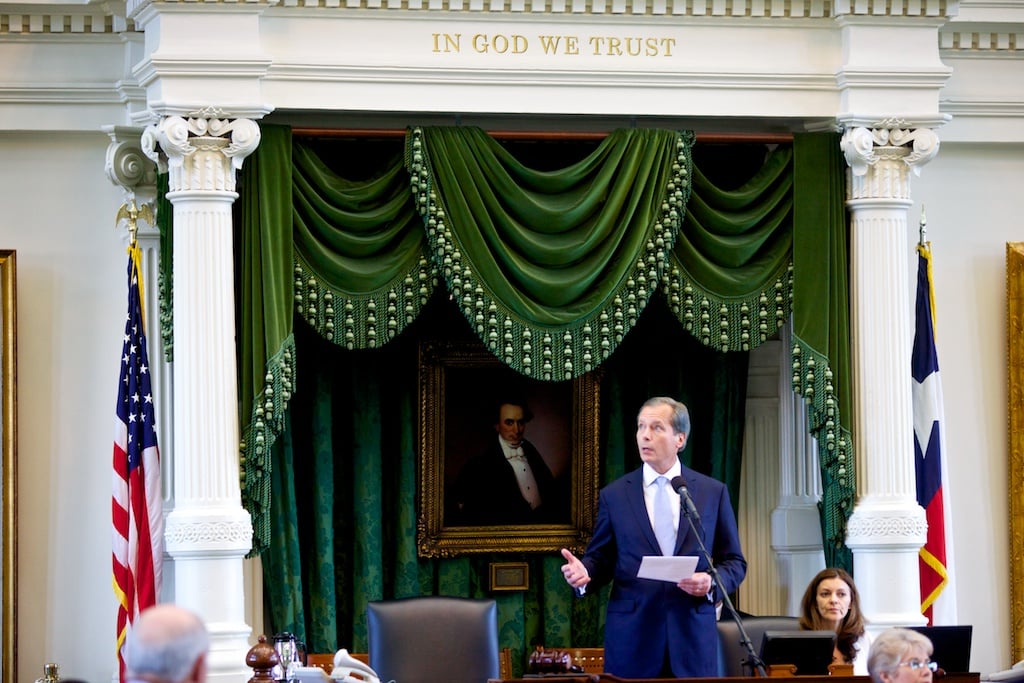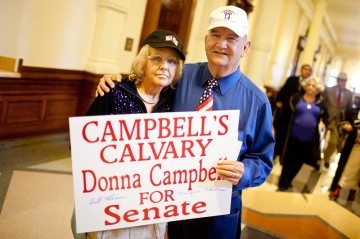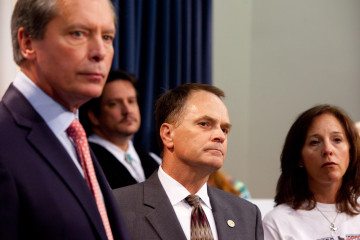
Texas Senate Tilts Rightward, 2014 Edition
In 2012, before last year’s general election, the Observer published a roundup of important state Senate races. The headline: “The Texas Senate Heads Toward the Right.” As the state heads toward this year’s Republican primaries, we could pretty much recycle that headline. And we pretty much have.
In four noteworthy primary elections this cycle—plus a special election in May—the conservative wing of the Republican Party stands a good chance of either retaining last election’s gains or making new ones. The Texas tea party’s strength in congressional elections may be receding, but at the state level, they have a number of chances in the next couple months to prove they are alive and well. And conversely, if they fail to show strength, it could be a sign that the party is starting to shift back slightly toward the middle.
In New Braunfels, tea party wunderkind Donna Campbell stands a good chance of retaining her seat. In Dallas, moderate, business-friendly incumbent John Carona is facing a tough challenge from a Ron Paul acolyte with tea party cred. Houston’s Dan Patrick seems set to be replaced by a man much like himself. The seat once held by outgoing senator Wendy Davis might be filled by a high-profile tea party leader. And in May, a special election will be held to replace outgoing senator Tommy Williams, with two hyper-conservative state Representatives vying for the seat.
Here’s a guide to five elections that will help you figure out the way the wind is blowing this Tuesday, and in the months afterward:
SD 25: DONNA CAMPBELL v. MIKE NOVAK v. ELISA CHAN

THE PLAYERS: When tea party champion Donna Campbell unseated independent-minded San Antonio Republican Jeff Wentworth in 2012, it was a huge upset. Campbell was poorly funded, inexperienced in politics and hailed from New Braunfels, an odd fit in a district dominated by San Antonio and northern Bexar County. Two years later, she’s no longer an outsider—and she’s struggling with a tough three-way primary fight with a relative moderate, San Antonio businessman Mike Novak, and former San Antonio City Councilwoman Elisa Chan, most famous for her homophobic remarks.
Campbell had a quixotic legislative session in which she strongly supported abortion restrictions (she called the point-of-order that ended Wendy Davis’ June filibuster) and managed to accomplish little else, something noted by some fellow Republicans in unusually frank language. ”There was a large learning curve [for Campbell] on a lot of the issues this session,” Republican state Rep. Lyle Larson of San Antonio told the Express-News in August. Larson added that he authored “a number” of bills important to San Antonio that Campbell declined to sponsor because she “didn’t understand it or support it.” She also voted for a bill that would ease the construction of toll roads in San Antonio, for which she’s received a large amount of flak from constituents.
Larson’s backing Mike Novak, a San Antonio businessman with connections to the city’s political establishment who might seem like a more natural fit for the district. In the ongoing conflict between the state Republican Party’s tea-party id and its money-making interests, Novak firmly represents the latter. Expect the victor’s supporters to cite the election of a mandate for their side.
On his website, Novak emphasizes job creation, transportation, and water: Campbell emphasizes the fight against Obamacare and touts her appearances with John Hagee, the ultra-right evangelist pastor who calls the Catholic Church the “great whore.” Campbell claims the support of Ted Cruz; Novak the endorsement of the Express-News.
There’s also Elisa Chan, a former San Antonio city councilwoman who seems unlikely to win a spot in a runoff but could act as a spoiler. Chan, who earned national infamy last year when a disgruntled aide released a secret recording of Chan calling homosexuality “disgusting” and “against nature” (and quite a bit else) in the run-up to a vote on the city’s non-discrimination ordinance. Running as a strong conservative, her presence could eat more of Campbell’s votes than Novak’s.
THE MONEY: Campbell, once an outsider, has been carpet-bombing her district with ads. In just three weeks in January, she spent more than $200,000, and, as of February 3, still had $168,575 on hand. Chan spent almost $150,000 during that period, with $76,286 on hand. Novak, who had been staying closer to his rivals in spending last year, spent only $50k, with a mere $8,000 remaining.
SD 16: JOHN CARONA V. DON HUFFINES

THE PLAYERS: In a chamber which has moved increasingly rightward, state Sen. John Carona retains a fairly unusual independent streak. Last session saw Carona trying to move payday lending regulation through the Legislature—the slow battering and defeat of which once led him to tell the Senate he “just want[ed] to go home and feed my cat”—in addition to important utility legislation.
As chairman of Senate Business and Commerce, he often found himself at the nexus between industry and efforts to reform industry. When he shaped and help pass a series of bills through the Legislature expanding the rights of microbreweries, some accused him of watering down the beer bills and being a shill for powerful beer distributors. But as with his payday lending reform package, Carona’s supporters argued he alone was willing to do the dirty work of hammering out a compromise between competing interests.
Not everyone agreed. Texas Monthly named him one of the session’s worst legislators, and a Texas Tribune investigation outlining some of Carona’s personal finances and apparent conflicts of interest between his business and legislative responsibilities made a splash. Meanwhile, he was named the most liberal Republican in the senate by Rice political scientist Mark Jones. All told, it was a bumpy year, and Carona’s seat seemed ripe for a strong, smart challenger.
Instead, he got Don Huffines.
Huffines, a multimillionaire businessman and tea partier, has the support of Glenn Beck, the endorsement of Rand Paul and Rick Santorum and the backing of Michael Quinn Sullivan’s Empower Texans. He’s also got plenty of money—most of it his. But when it comes to his campaign, Huffines has seemed unserious. Whether you like Carona or not, there’s a lot in his record a challenger could campaign on. So it’s been slightly surprising for observers that Huffines’ biggest issue on the trail so far has been the fact that Carona once co-sponsored a bill in the Legislature that would have named a portion of Interstate 20 in South Dallas the “Obama Freeway.”

The bill died a quick death, but five years later, Huffines appears to think it’ll float his boat all the way to the Capitol. There are other oddities: Huffines sent out one of the strangest mailers of the whole cycle so far, with Carona as a Brando-esque mafia-don. The Dallas Morning News’ editorial board called it “comically bad.”
Still, it’s the toughest race Carona has faced in decades. If Huffines wins, it’ll be seen as proof that no right-wing challenger, if supplied with money and endorsements, is so light-weight that they can’t threaten a Republican who’s wandered too far from the flock. If Carona wins, expect to see the business interests and moderate Republicans that back him proclaim that the result is evidence the tea party can be beat. And a Huffines win would shake up the Legislature in a big way. Huffines could be one of the most conservative senators in the chamber. In his campaign he’s been a flashy, ideological competitor, the total opposite of Carona’s moderate establishment-ism and affection for the political inside-game. This one could significantly change the Senate’s internal dynamics like few other Republican primary races.
The Money: Huffines, a prodigious self-funder, has actually outdone the incumbent recently. He spent more than $1.4 million in February, reporting $174,000 left on Feb. 24. He’s loaned more than $1.6 million to himself over the course of the campaign, and family members have donated hundreds of thousands of dollars. Carona’s spent more than $1.2 million with only $54,000 left on February 24. He’s carrying $1.5 million dollars in loans.
SD 7: PAUL BETTENCOURT VS. JAMES WILSON

THE PLAYERS: Sen. Dan Patrick is a conservative radio talk-show host and businessman who loves picking fights with Democrats and railing against taxes. He’s 63, white, and hails from the Houston ‘burbs.
Paul Bettencourt is a conservative radio talk-show host and businessman who loves picking fights with Democrats and railing against taxes. He’s 55, white, and hails from the Houston ‘burbs.
So, who better to succeed Dan Patrick in Senate District 7 than his political doppelgänger?
Bettencourt is the heavy favorite in this deeply Republican enclave of northwest Houston, which stretches from I-10 north to Tomball and Spring and includes a disproportionate number of golf courses. Patrick, of course, is trying to take hold of the Senate gavel and move up to lieutenant governor. That leaves his senate seat open—and the Republican primary, featuring Bettencourt and Phil Gramm protege James Wilson, will almost certainly decide the winner.
Although Bettencourt lacks the smarmy braggadocio of Dan Patrick (“Think of Paul Bettencourt as a good-natured Dan Patrick” is how the Houston Chronicle put it), he’s earned his conservative warrior status. Bettencourt served 10 years as Harris County tax assessor-collector, where earned the nickname “The Taxman.” Harris County tax assessor is a politically-charged office in part because it oversees the voter rolls in vote-rich Houston. On his campaign website, Bettencourt brags that he was pushing for requiring a photo ID at the polls “before it was ‘cool’.” His aggressive purging of the voter rolls drew accusations—and lawsuits—from the Texas Democratic Party that he was illegally scrubbing Democratic-leaning voters. Then there was the matter of his very short third term: In 2008, he narrowly beat his Democratic opponent, but quit just a month later, before he was even sworn in, to start up a tax advising firm.
Bettencourt described himself to Quorum Report as a “public policy guy” who was called back to public service to deal with weighty issues like rejiggering school finance.
Also in the hunt is James Wilson, a Spring insurance agent who—in a not-so-subtle jab at Bettencourt—”promises to serve a full term” if elected. His other career highlight is serving as a regional director for former U.S. Sen. Phil Gramm. Wilson ran against state Rep. Debbie Riddle in 2012, losing 81-19.
The Money: Bettencourt has the edge here, by far. He raised $142,000 between July and late January, with $61,000 still on hand. Wilson has raised just $7,675 in the same time period.
SD 10: WENDY DAVIS’ REPLACEMENT FREE-FOR-ALL

THE PLAYERS: Senate District 10 might be the only Senate seat to switch party hands this year, so it’s been the focus of a lot of attention. It was also the source of a lot of handwringing among Dems—Davis was able to pull off a narrow underdog win in this district in 2012, but Republicans gunned for SD 10 during redistricting, tilting the district further to the right. That made her 2014 re-election prospect an even more uphill battle for her. So she opted to run for governor instead.
If she loses her gubernatorial race and Democrats lose SD 10, some might wonder if her race was worth it. A Republican win in SD 10 would give the GOP 20 seats in the Texas Senate, one seat away from gaining a supermajority under the senate’s two-thirds rule, in which 21 votes are necessary to consider bills. It also puts them two seats over the margin of 60 percent control, which some Republican lieutenant governor candidates are talking about adopting as a threshold for taking up a bill instead of the two-thirds (66 percent) rule next session. Bottom-line: The stakes are high.
There are five GOP candidates in the primary, making a runoff a near certainty. But the Republican frontrunner in the district could be Konnie Burton, a tea party activist who was the first to announce her run. Burton’s been endorsed by Rafael Cruz (Ted’s dad), Michael Quinn Sullivan’s Empower Texans, and tea party elected officials like state Reps. Jonathan Bedford (R-Bedford); Matt Krause (R-Arlington); Bill Zedler (R-Arlington); and Giovanni Capriglione (R-Southlake). She’s received the backing of a large number of conservative activists, and seems likely to be in the runoff.
Former state Rep. Mark Shelton, the candidate who lost to Davis in the 2012 upset, is also running, and could end up in the primary with Burton. Shelton lost to Davis 51-49, and had been planning a rematch ever since. He cuts a slightly more establishment figure than Burton. There’s also chiropractor Jon Schweitzer, former Colleyville City Councilman Mark Skinner and Arlington School Board Trustee Tony Pompa.
On the Democratic side, some hoped Fort Worth city councilman Joel Burns would run, but he ruled himself out in October. (Now he’s resigning to go to Harvard.) Now, Dems have only two candidates vying for their nomination: energy executive Mike Martinez, and Libby Willis, who bills herself as a neighborhood association leader. All told, the district looks like a likely GOP pick-up. If the Democratic nominee proves to be an unusually adept candidate, and Burton wins the GOP primary and proves to be too-far right for the district, it might be more competitive—but Republicans would seem to have a comfortable margin. If voters replace Wendy Davis with a tea party organizer, it would, of course, dramatically change the Senate.
THE MONEY: On the Republican side, Burton and Shelton are competitive. Burton spent $85,724 in February, and has a little under $59,000 on hand at the end of February. Shelton spent $71,195 in the same period, with $129,482 on hand. In third is Pompa, who spent $61,600, with $29,000 on hand. Schweitzer reports only $3,900 spent, with $2,500 on hand, and Skinner has only $1,800 on hand, having spent $6,300.
For the Democrats, Martinez lags behind Willis. Willis spent over $88,000 in February, with $48,000 left—plus a post-report $15,000 infusion from the Association of Federal, State, County, and Municipal Employees (AFSCME). Martinez spent a mere $5,685, with $35,866 in the bank.
SD 4: BRANDON CREIGHTON v. STEVE TOTH v. GORDY BUNCH (Special Election, May 10)

THE PLAYERS: When powerful state Sen. Tommy Williams resigned in October to take up a lucrative position at Texas A&M, he was capping off a conservative but somewhat idiosyncratic tenure in the Senate. He was one of the primary legislators responsible for the voter ID law that passed in 2011, but this session, as chair of the Senate Finance Committee, he was responsible for a lot of spending increases that accompanied 2013’s newly healthier state coffers. He helped push major spending packages on water and transportation infrastructure, something that infuriated the right wing of his party. In 2009, he was on Texas Monthly’s list of worst legislators; in 2013 he was named one of the best. Then he announced he was stepping down, forcing a special election scheduled in May. Whoever wins will replace him for the remainder of his 4-year term, which ends in 2016.
The two GOP candidates are state Reps. Steve Toth and Brandon Creighton, who both hail from the far right of their party. Toth has been a smart but fiercely conservative—sometimes obstinate—state rep, serving The Woodlands since 2012. His freshman term in the House was filled with conflict. On the House Criminal Jurisprudence Committee he frequently sparred with those seeking reform. He carried a bill that would have nullified federal gun laws, one of the most absurd gun measures ever floated in the Texas Legislature. In August, he tweeted that President Obama was about to launch military strikes in Syria to “support his friends in Al-Qaeda.” He didn’t accomplish all that much, and his decision to run for Senate after just one term came as something of a surprise.
Creighton’s no centrist, either. Since 2006, he’s represented Conroe in the House. In 2011, he chaired the Select Committee on State Sovereignty, a red-meat machine that had little practical impact. He supported campus carry, and Toth’s nullification bill. But as chairman of the House GOP caucus, he may be more comfortable playing the inside game than Toth is: He attempted to employ a couple of clever maneuvers in support of the big water bill last session, whereas Toth has often acted as a bomb-thrower.
There’s also Gordy Bunch, a political outsider and Coast Guard veteran from The Woodlands. Creighton’s and Toth’s political ties and House experience make them the favorites for the seat, but anything’s possible in a special election. It’s possible that Bunch could force the already-strangely timed May 10 special into a runoff.
THE MONEY: The latest financial information comes from January 15, but it has Creighton blowing his opponents away in fundraising: He has more than $1 million on hand, having spent more than $205,000 in the last six months of the year. Toth spent $48,000 and had $123,000 on hand. Bunch, meanwhile, spent only $8,000 in the same time frame but retained over $274,000.


